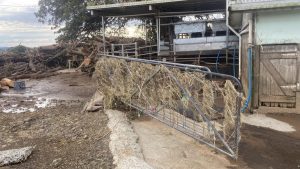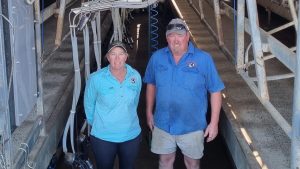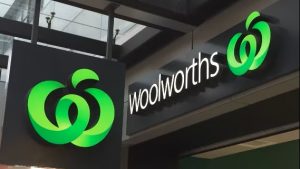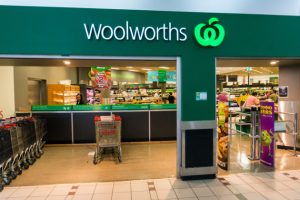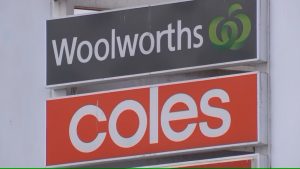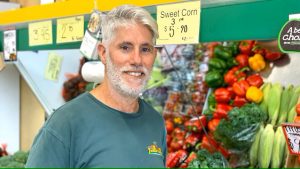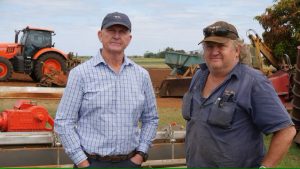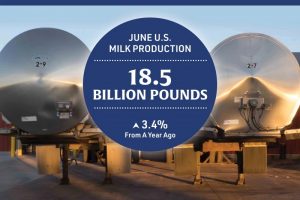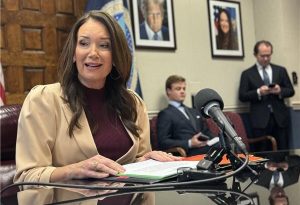
Coles and Woolworths say they’re looking out for you – they are the fresh food people or the home of everyday low prices.
But this narrative has fractured over the last year as shoppers, workers and farmers feel the squeeze of the powerful duopoly.
Four Corners has spoken to insiders, experts, and the supermarket CEOs themselves to find out just how they operate.
Here’s what you need to know about how they keep prices high and competitors out.
Our supermarket sector is one of the least competitive in the world.
Coles and Woolworths control 65 per cent of the grocery market. Aldi has just 10 per cent.
On average, for every $10 Australians pay for groceries, $6.50 of that is spent at the big two.
The UK has five major players vying for a cut of that $10. The US has multiple supermarket chains.
Last year Woolworths’ costs of doing business were flat but its profit margin from selling groceries grew from 5.3 to 6 per cent. That’s an extra $318 million in profits in one year alone.
Coles saw a small increase in costs, pushing its profit margin down slightly to 4.8 per cent.
Supermarket aisles are littered with signs boasting “Special”, “Low” or “Locked” prices.
What you might not know is that often grocery suppliers and brands are expected to fund these promotions.
That means suppliers will often set their recommended retail price at a higher level, knowing they have to offer deep discounts for much of the year.
An item that a supplier can afford to sell for $15 for some of the year might initially be listed at $30 just so it can later be promoted as 50 per cent off.
There are other costs for suppliers wanting to do business with the big two, including in-house advertising and promotions.
A full-page ad in Woolworths’ Fresh Magazine costs $30,000. A spot on Coles radio is worth $28,000.
They even charge suppliers a fee if stock is damaged while being sold on their shelves.
All these extra costs demanded by the supermarkets flow into higher grocery prices at the check-out.
The big two compete for customers, but there’s often little difference in prices.
Julian Hilliard’s worked in retail for 38 years, including as a buyer or category manager for Coles and Woolworths. The buying decisions he made would affect stock and prices in stores across the country.
He says when he worked for Woolworths, if Coles put up a price, they would quickly follow.
“They’re more or less identical in many respects.”
“I would probably say that if you did five shops in Woolworths and five shops in Coles … you’d be a few cents difference maybe depending on the specials.”
Rod Sims, who headed the consumer watchdog ACCC for 11 years, says the lack of competition means shoppers are losing out.
“There’s no doubt we are paying higher prices than we should,” Mr Sims says.
“All the economic evidence in supermarkets, or similar sectors all around the world, say that when you get this much concentration, you’re going to get higher prices.”
Insiders accuse the “big two” of exploiting their market power to pressure suppliers and increase their profits.
Leaked emails show how Coles dealt with one multinational supplier who wanted to increase prices on its products.
While Coles initially expressed concern about the impact on customers, when the supplier made a one-off payment of $25,000 the retailer agreed to the price increase.
A source, who works for the multinational supplier, says Coles then passed on the full price rise to customers.
Coles chief executive Leah Weckert says that does not amount to price gouging.
“We have a team of people whose job it is to look to validate cost, price increases and we take that job very seriously.”
Meanwhile, an industry insider says Woolworths began a campaign 18 months ago to increase its profit margins – asking to “share” in any price increases it granted to its suppliers.
It worked by the supermarket directly requesting some of the price increase back from suppliers in the form of a rebate.
That meant consumers ended up paying more, and suppliers did not get the full price increase, but Woolworths significantly increased its profit margins.
Woolworths CEO Brad Banducci says the company does not employ the tactic. He says Woolworths is “very keen to make sure we don’t pass on anything more to our customers than is required”.
Coles and Woolworths use their market power to push their own homebrand products.
Because shoppers often have no idea, these are known as “phantom brands”.
In a Coles-owned bottle shop, like First Choice or Vintage Cellars, there are about 260 homebrand wines on the shelves.
Take this bottle of Two Churches shiraz, sold in Coles’ Vintage Cellars …
Online, and through the image on the bottle, the wine has been promoted as a tale from the Barossa Valley – telling the story of two Lutheran priests with rival churches bonding over the quality of the region’s grapes.
There’s no Coles logo anywhere on the bottle, but look closely and the address in small print on the back is Hawthorn East in Melbourne — Coles’ corporate headquarters.
“I think they’re sort of misleading the consumer to a certain degree on putting this on the shelf as a branded product,” fifth-generation Barossa grape grower Adrian Hoffmann says.
“It sounds like a Barossa story, but you can’t be guaranteed it’s Barossa fruit, unfortunately.”
After questions from Four Corners, references to the Barossa were removed from Coles’ websites promoting the wine.
Coles CEO Leah Weckert says she wasn’t familiar with Two Churches but that the company is “very comfortable” that its approach to branding “is one that resonates with customers”.
One recent example shows how the promise of some supermarket promotions isn’t always kept.
Coles announced last year it had “locked” prices on a range of items.
But consumer group Choice found the retailer had then raised these prices earlier than it promised.
Coles conceded there were 20 “locked” items where prices were raised, including Corn Flakes, barbecue briquettes, dishwashing tablets, and thickened cream.
Choice campaigns director Rosie Thomas says Coles has started refunding people who shopped online or have Flybuys accounts.
“But there will still be a large number of consumers who bought these products in store. Unless they show up with receipts, they’re not going to get refunds,” she says.
Despite having misled consumers, Coles was not fined or sanctioned.
Coles CEO Leah Weckert says the company’s worked on its processes to ensure it doesn’t happen again.
“We have refunded substantially more than what the benefit was to Coles from the increase in price,” Ms Weckert says.
One of the key tactics the big two use to fight off competitors is through controlling land.
They scour the country and buy up sites years before they even get approvals to build.
If they get the green light, it’s a new shopping complex. If not, they’ve at least kept their rivals out.
German supermarket giant Kaufland abandoned plans to enter the Australian market in 2020.
Media reports said a lack of suitable sites was one factor.
In one growing community west of Brisbane, Woolworths has bought more than 6 hectares of land over 11 years. But an actual supermarket is still years away.
Woolworths CEO Brad Banducci says it’s not about keeping out competitors.
“It’ll be … we need a store in a new area and so you’ll buy some land and wait for the community to start moving into the area.”
One of the key tactics the big two use to fight off competitors is through controlling land.
They scour the country and buy up sites years before they even get approvals to build.
If they get the green light, it’s a new shopping complex. If not, they’ve at least kept their rivals out.
German supermarket giant Kaufland abandoned plans to enter the Australian market in 2020.
Media reports said a lack of suitable sites was one factor.
In one growing community west of Brisbane, Woolworths has bought more than 6 hectares of land over 11 years. But an actual supermarket is still years away.
Woolworths CEO Brad Banducci says it’s not about keeping out competitors.
“It’ll be … we need a store in a new area and so you’ll buy some land and wait for the community to start moving into the area.”
Fruit and vegetables are crucial for getting shoppers through the front door at Coles and Woolworths.
Jeremy Griffith, who sits on the horticulture council at the National Farmers Federation, says when it comes to negotiating prices, the big two hold all the cards.
“The retailers are acutely aware of this issue and they can leverage it, they can exploit it … offering very super, super low prices to the growers knowing full well that at the end of the day, the grower has almost no choice but to accept.”
Third-generation cherry farmer Michael Cunial was one of those growers. He’s now getting out of the industry.
“We’re at the mercy of them. We’re price takers. So the profit just isn’t there anymore,” he says.
“There’s a huge, huge imbalance. Supermarkets are making these multi-billion-dollar profits and growers are losing money.”
Coles CEO Leah Weckert says farmers do have other options, like selling to independent grocers, the food service market or the export market.
“We work closely with our suppliers because we know our suppliers have to be successful for us to be successful,” she says.
Politicians from all sides are now talking about taking on the supermarket duopoly.
Multiple inquiries and reviews have been called into the sector, including:
- A Greens-led senate inquiry into price gouging
- A 12-month ACCC inquiry into pricing
- The Food and Grocery Code of Conduct, a voluntary code between suppliers and retailers, is being reviewed
- Queensland’s parliament is holding its own inquiry into grocery prices
Some are clear about what needs to change.
Former ACCC boss Rod Sims says Australia needs tougher merger laws.
That would allow the watchdog to curtail Coles and Woolworth’s ability to gobble up rivals, buy land and move into other industries.
“I think there’s no doubt … if you want consumers to pay less for goods in supermarkets, change the merger laws,” he says.
The Greens, who are chairing the upcoming Senate inquiry into supermarket prices, are exploring more radical change, including breaking up Coles and Woolworths.
“The acid test on the Prime Minister is not going to be what reviews or what processes he’s prepared to put in place. It’ll be what action he’s prepared to take,” inquiry chair and Greens Senator Nick McKim says.
You can now read the most important #news on #eDairyNews #Whatsapp channels!!!
🇺🇸 eDairy News INGLÊS: https://whatsapp.com/channel/0029VaKsjzGDTkJyIN6hcP1K




